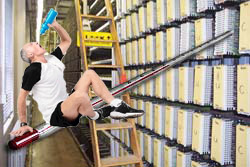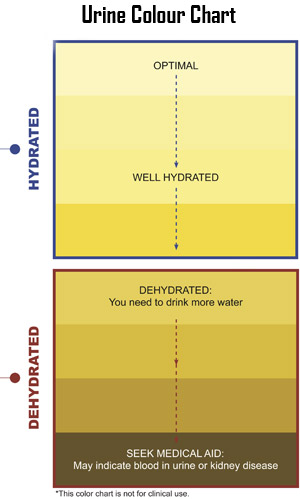BT has undertaken a policy change and is removing all chilled drinking water dispensers from within the usually hot Main Distribution Frames (MDFs) of telephone exchanges, thereby necessitating engineers working in the area to find an alternative place within the building that has a fresh drinking water supply. These will inevitably be found in toilet areas.
With engineering work time being measured continually via computer based job management systems, and allotted time given to all jobs; the pressure to forego water because of the time it would take to walk to another area of the building for a drink and therefore making the job take longer, will result in dehydration, particularly in weather such as we have currently.
 Following concerns raised about this latest ‘penny pinching’ exercise by BT Openreach by CWU Health and Safety committees around the country, including the NW BT Unions Health and Safety Co-ord; Steve Mann, Telecoms Officer within the CWU Health Safety and Environment Department wrote to BT Openreach expressing concerns.
Following concerns raised about this latest ‘penny pinching’ exercise by BT Openreach by CWU Health and Safety committees around the country, including the NW BT Unions Health and Safety Co-ord; Steve Mann, Telecoms Officer within the CWU Health Safety and Environment Department wrote to BT Openreach expressing concerns.
The reply he received was disappointing to say the least and ignored the need for fresh chilled drinking water to be within the work area concerned and the issues regarding job management and delays to jobs as a result of engineers having to move around a telephone exchange building which in most cases has little in the way of welfare facilities, apart from toilets.
BT Openreach said:
“The issue has been discussed at a Senior level. Although the Company is no longer providing chilled water dispensers in MDF areas drinking water is still available in our buildings which all employees have access to as per the requirements in the Workplace (Health, Safety & Welfare) regulations.
If there are any specific sites which you have concerns over in regards to these requirements then please let me know and the issue will be investigated.”
Pointing out the serious consequences for the health, safety and welfare of company’s engineering men and women, Steve responded by asking the company to “urgently reconsider this decision to withdraw all water dispensers at MDF’s."
Steve also wrote: "This decision smacks of Openreach putting costs before peoples safety and comfort.”
His email continued:
“Given the excess temperatures and the uncomfortable working conditions being suffered by Openreach people in Telephone Exchanges, particularly on MDF’s., this decision does not seem logical.
The Workplace (Health, Safety and Welfare) Regulations 1992 states:
Drinking water
22.—(1) An adequate supply of wholesome drinking water shall be provided for all persons at work in the workplace.
(2) Every supply of drinking water required by paragraph (1) shall—
(a)be readily accessible at suitable places; and
(b)be conspicuously marked by an appropriate sign where necessary for reasons of health or safety.
(3) Where a supply of drinking water is required by paragraph (1), there shall also be provided a sufficient number of suitable cups or other drinking vessels unless the supply of drinking water is in a jet from which persons can drink easily.
The Regulations also state that drinking water should not be installed as far as reasonably practicable in sanitary accommodation.
Therefore can you guarantee that all Openreach people in TE’s will have:
· fresh drinking water provided to them which is readily accessible in a suitable place;
· Cups will be supplied at all water taps;
· That drinking water will be provided somewhere other than the toilet."
It needs to be pointed out that the issue of fresh drinking water availability in all work areas, irrespective of the industry in which people are employed, is a very serious one. The consequences of dehydration has an impact not only on the health of an individual, but also on their ability to perform their job adequately and safely.
Productivity always suffers when workers are not drinking fresh water in sufficient amounts and frequencies. Indeed, many of the alternative forms of liquid intake can actually add to dehydration risks.
But none of this stopped a dismissive response from BT Openreach to Steve Mann's email above:
"Fresh drinking water is provided in our buildings which is readily accessible and in a suitable place,
The vast majority of premises will be equipped with drinking vessels where there is problem with local provisions local arrangements will be made.
As per the regulations wherever reasonably practicable the drinking water is not located in sanitary facilities."
 Unionsafety would like to point out to BT Openreach exactly what the HSE website advises:
Unionsafety would like to point out to BT Openreach exactly what the HSE website advises:
‘Dehydration can seriously affect an employee's ability to function safely when under thermal stress. Dehydration effects can be minimised in heat stress situations by encouraging employees to frequently drink cool water (rather than tea, coffee or carbonated drinks) in small volumes to compensate for losses due to sweating.
Also you should be aware that thirst is not a good indicator of dehydration as if you are thirsty you are already starting to suffer from the effects of dehydration.
What this means is that when working hard in heat stress conditions employees should consume around 250 ml (half a pint) every 15 minutes or 500 ml (a pint) every 30 minutes.
However this approach may not be practical due to the nature of the task e.g. wearing PPE that restricts the ability to drink or working in industries where hygiene requirements prevent the consumption of food or drink.
In these circumstances an alternative approach is drinking 500 ml of water per hour before work commences and encouraging the drinking of 500 ml of water during their rest periods.
This may meet their water demands during the work period but if water loss is significantly greater, then water intake should increase proportionately. Also even if workers replenish the lost sweat with equal amounts of water, they may still be susceptible to dehydration due to salt losses caused by excessive sweating. This means that before they start work they should ensure that they are adequately hydrated.’
Despite this, and perhaps because the BT Openreach decision was made in ignorance of these facts; men and women working in the MDF areas within telephone exchanges are being put at risk of dehydration and consequently a greater risk of accidents and injury.
This will cost far more to the profit margin of the company than leaving existing chilled water dispensers in MDF areas in place!
The Union awaits a response from BT Openreach to what will no doubt be a continuation of complaints from their employees via the CWU, to this 'dickensian' and 'scrooge-like' decision and putting profit before the welfare of their employees.
Source: CWU / Unionsafety / HSE / ARMCHEM
See also: TUC Urges Employers To Cool Down Their Workplaces And Their Staff
Download the Urine Chart in  PDF format by clicking on the pic above. Also available from the E-Library Database
PDF format by clicking on the pic above. Also available from the E-Library Database


 Following concerns raised about this latest ‘penny pinching’ exercise by BT Openreach by CWU Health and Safety committees around the country, including the NW BT Unions Health and Safety Co-ord; Steve Mann, Telecoms Officer within the CWU Health Safety and Environment Department wrote to BT Openreach expressing concerns.
Following concerns raised about this latest ‘penny pinching’ exercise by BT Openreach by CWU Health and Safety committees around the country, including the NW BT Unions Health and Safety Co-ord; Steve Mann, Telecoms Officer within the CWU Health Safety and Environment Department wrote to BT Openreach expressing concerns.